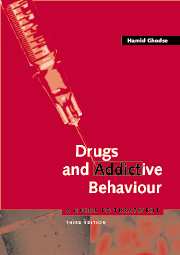Book contents
- Frontmatter
- Contents
- Preface
- Introduction
- 1 Drugs, addiction and behaviour
- 2 Drug dependence in the UK – and elsewhere
- 3 Drugs of abuse and dependence
- 4 Alcohol
- 5 Assessment
- 6 General measures of intervention
- 7 Specific methods of treatment
- 8 Complications of drug abuse and their treatment
- 9 Special problems
- 10 Follow-up and treatment outcome
- 11 Prevention of drug abuse
- 12 The law and drug control policies
- Appendices
- References and further reading
- Index
7 - Specific methods of treatment
Published online by Cambridge University Press: 06 January 2010
- Frontmatter
- Contents
- Preface
- Introduction
- 1 Drugs, addiction and behaviour
- 2 Drug dependence in the UK – and elsewhere
- 3 Drugs of abuse and dependence
- 4 Alcohol
- 5 Assessment
- 6 General measures of intervention
- 7 Specific methods of treatment
- 8 Complications of drug abuse and their treatment
- 9 Special problems
- 10 Follow-up and treatment outcome
- 11 Prevention of drug abuse
- 12 The law and drug control policies
- Appendices
- References and further reading
- Index
Summary
Opiates
By the time that they seek help for their drug problem, most of those who abuse opiates have an established dependency and are seeking some sort of pharmacotherapy. They may want to come off drugs but fear the abstinence syndrome too much to attempt it alone, or they may be hoping for a long-term prescription for opiates because they are finding it increasingly difficult to maintain their drug habit from illicit sources.
Before any decision is made about detoxification using opiates or long-term maintenance treatment, it is essential to be sure that the patient is indeed genuinely physically dependent on opiates. This diagnosis is based on information acquired during the assessment period (Chapter 5); it relies on the history of drug-taking, with attention being given to whether the financial means of the patient adequately account for the drug use claimed, and the patient's familiarity with the drug scene. A careful physical examination, looking particularly for signs of opiate withdrawal (Chapter 3) and of self-injection, and the results of several urine tests are also very important. If the out-patient assessment of physical dependence is equivocal, the Ghodse Opiate Addiction Test (Chapter 5) can be tried and/or the patient admitted to hospital for more careful observation.
- Type
- Chapter
- Information
- Drugs and Addictive BehaviourA Guide to Treatment, pp. 242 - 281Publisher: Cambridge University PressPrint publication year: 2002



